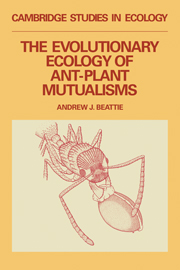Book contents
- Frontmatter
- Contents
- Preface
- 1 Introduction
- 2 Origins and early evolution of ant–plant mutualisms
- 3 Plant protection by direct interaction
- 4 Plant protection by indirect interaction
- 5 Myrmecotrophy
- 6 The dispersal of seeds and fruits by ants
- 7 Ant pollination
- 8 Food rewards for ant mutualists
- 9 Variation and evolution of ant–plant mutualisms
- References
- Index
- Frontmatter
- Contents
- Preface
- 1 Introduction
- 2 Origins and early evolution of ant–plant mutualisms
- 3 Plant protection by direct interaction
- 4 Plant protection by indirect interaction
- 5 Myrmecotrophy
- 6 The dispersal of seeds and fruits by ants
- 7 Ant pollination
- 8 Food rewards for ant mutualists
- 9 Variation and evolution of ant–plant mutualisms
- References
- Index
Summary
The natural history of ant–plant mutualisms has fascinated Western scientists for roughly two centuries. During this time it has become clear that the ways in which plants manipulate ants, and vice versa, can be so complex and subtle as to severely stretch the credence of the observer. The early natural historians described ant–plant relationships in superb detail, but generally inferred that a given relationship was mutualistic from anatomical, morphological, or behavioral data alone. Experimental verification was the exception rather than the rule. Although the experimental approach was tried by a few early workers, such as von Wettstein (1889), its impact was not dramatic until the publication of Janzen's seminal work on acacia ants about twenty years ago. This pioneering research has since been followed by many excellent experimental field studies embracing a variety of ant–plant mutualisms from many kinds of environments. Our knowledge of the selective pressures that produce the mutualistic response, the dynamics of the ant–plant interactions, the benefits to the plants and the ants, and the ways that mutualisms evolve has been vastly improved. At the same time, ant–plant mutualisms are extremely numerous and varied, and so far only a very few cases have been adequately analyzed. As a consequence, generalizations from limited data often have to be made. Whether or not this is wise will be revealed as new studies are published.
Ideas and syntheses generally enter the mind as a result of the stimulation of colleagues.
- Type
- Chapter
- Information
- The Evolutionary Ecology of Ant–Plant Mutualisms , pp. ix - xPublisher: Cambridge University PressPrint publication year: 1985

